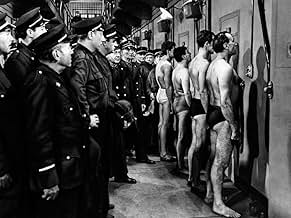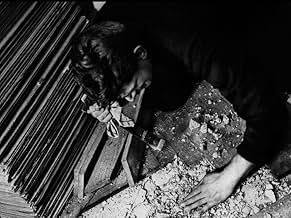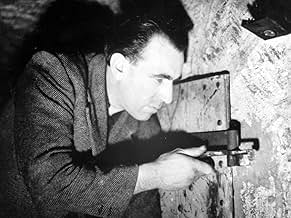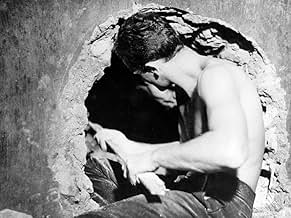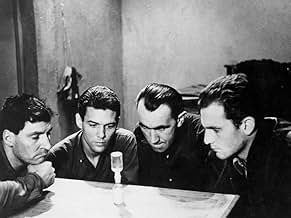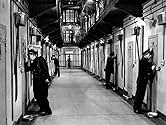VALUTAZIONE IMDb
8,5/10
21.951
LA TUA VALUTAZIONE
In carcere quattro detenuti condannati a lungo che pianificano una fuga elaborata inducono cautamente un nuovo detenuto a partecipare al loro piano, il che porta a sfiducia e incertezza.In carcere quattro detenuti condannati a lungo che pianificano una fuga elaborata inducono cautamente un nuovo detenuto a partecipare al loro piano, il che porta a sfiducia e incertezza.In carcere quattro detenuti condannati a lungo che pianificano una fuga elaborata inducono cautamente un nuovo detenuto a partecipare al loro piano, il che porta a sfiducia e incertezza.
- Regia
- Sceneggiatura
- Star
- Nominato ai 2 BAFTA Award
- 2 vittorie e 4 candidature totali
Marc Michel
- Claude Gaspard
- (as Mark Michel)
Jean-Paul Coquelin
- Le lieutenant Grinval
- (as J. Paul Coquelin)
Albert Augier
- Un gardien
- (non citato nei titoli originali)
Jean Becker
- Un gardien
- (non citato nei titoli originali)
Mick Besson
- Deuxième plombier
- (non citato nei titoli originali)
Georges Bielec
- Figurant
- (non citato nei titoli originali)
Raymond Bour
- Un gardien
- (non citato nei titoli originali)
Lucien Camiret
- Maurice Gaillardbois - Le détenu qui refuse de s'alimenter
- (non citato nei titoli originali)
Philippe Dumat
- Un gardien
- (non citato nei titoli originali)
Gérard Hernandez
- Le détenu à l'infirmerie
- (non citato nei titoli originali)
Jean Luisi
- Un détenu
- (non citato nei titoli originali)
Recensioni in evidenza
This most powerful of escape stories is a wonderful exposition of the most basic human qualities, ingenuity and cooperation, and the innate drive toward freedom that brings these qualities into being.
While the theme of transcendence is certainly present (although not be-labored) as in A MAN ESCAPED, it is interesting that, in direct contrast to Bresson's work, transcendence is here achieved through work WITH others on a task. The inmates form a unique brotherhood through their joint reliance. This allows them to be IN the prison while not OF it and is quietly visible from the early moments of the film. We see this group bond deepened through each risk taken, each chisel blow against a concrete wall, and we become emotionally tied to the characters' quest simply through observing their effort (it is amazing how dramatic hammering away at a concrete wall can be). No verbal exposition is necessary, no creation of characters and their pasts intrudes to distract us from their task, which IS the drama.
Indeed Becker's film is as notable for what is left out as for what is included. There are no prison "types" created, his style is restrained to the point of being transparent, not to the point of calling attention to itself as "bare" or "ascetic" as Bresson's is. We get no exposition of the horrors of prison life; just enough detailing of the regimentation, drabness of environment, and lack of personal space to make us aware of the institution's suffocating presence. There are no sudden surprises or plot shifts. Well, maybe one. The shot in the mirror near the end of the film is so surprising that I literally couldn't take it in for a few seconds, I thought it had to be a dream: that's how involved with the characters I was! Finally, there is no use of music to pump up the suspense. There IS, however, a powerful and unique use of sound. We hear, in an almost hallucinatory fashion, every thump, clang, and wail within the prison walls and, during the digging scenes, Becker apparently uses a dual soundtrack combining naturalistic sound with heightened effects of the digger's grunts, heavy breathing, and THUMPS of metal against rock. Again this serves to effectively involve us with physical/emotional effort of their task. The cacophony the end of the film harshly accents our sense of disturbance and loss.
It is also worth noting that the apparent "innocent" in the film is the only one who does not achieve transcendence. While he may legitimately gain his freedom, he remains locked within the bounds of his own ego ("poor Pierre" says the leader of the break). Another interesting contrast (reply?) to Bresson.
Altogether a powerful statement that humans at work can be intrinsically dramatic subject matter, that the most simple of subjects can be the most visually entrancing (and emotionally resonant) and a grand illustration of the maxim that "God (and/or art) is in the details". 10/10
While the theme of transcendence is certainly present (although not be-labored) as in A MAN ESCAPED, it is interesting that, in direct contrast to Bresson's work, transcendence is here achieved through work WITH others on a task. The inmates form a unique brotherhood through their joint reliance. This allows them to be IN the prison while not OF it and is quietly visible from the early moments of the film. We see this group bond deepened through each risk taken, each chisel blow against a concrete wall, and we become emotionally tied to the characters' quest simply through observing their effort (it is amazing how dramatic hammering away at a concrete wall can be). No verbal exposition is necessary, no creation of characters and their pasts intrudes to distract us from their task, which IS the drama.
Indeed Becker's film is as notable for what is left out as for what is included. There are no prison "types" created, his style is restrained to the point of being transparent, not to the point of calling attention to itself as "bare" or "ascetic" as Bresson's is. We get no exposition of the horrors of prison life; just enough detailing of the regimentation, drabness of environment, and lack of personal space to make us aware of the institution's suffocating presence. There are no sudden surprises or plot shifts. Well, maybe one. The shot in the mirror near the end of the film is so surprising that I literally couldn't take it in for a few seconds, I thought it had to be a dream: that's how involved with the characters I was! Finally, there is no use of music to pump up the suspense. There IS, however, a powerful and unique use of sound. We hear, in an almost hallucinatory fashion, every thump, clang, and wail within the prison walls and, during the digging scenes, Becker apparently uses a dual soundtrack combining naturalistic sound with heightened effects of the digger's grunts, heavy breathing, and THUMPS of metal against rock. Again this serves to effectively involve us with physical/emotional effort of their task. The cacophony the end of the film harshly accents our sense of disturbance and loss.
It is also worth noting that the apparent "innocent" in the film is the only one who does not achieve transcendence. While he may legitimately gain his freedom, he remains locked within the bounds of his own ego ("poor Pierre" says the leader of the break). Another interesting contrast (reply?) to Bresson.
Altogether a powerful statement that humans at work can be intrinsically dramatic subject matter, that the most simple of subjects can be the most visually entrancing (and emotionally resonant) and a grand illustration of the maxim that "God (and/or art) is in the details". 10/10
Jacques Becker's "Le Trou" is one of the greatest of all prison-break films. No film lover should miss it. It is every bit as masterful and tense as other milestones of this subgenre, including John Sturges' "The Great Escape," Robert Bresson's masterpiece "A Man Escaped," and Don Siegel's "Escape from Alcatraz." The meticulous preparation for the escape is a nail-biter, with many adrenaline-inducing close calls. The ringer: Will the newly exonerated prisoner stay with the group and escape or rat on the others? Those seeking pure entertainment or those seeking existentialist philosophical fare will be equally pleased. A memorable movie experience.
10palmiro
This film is riveting in its attention to the details of a prison escape and to the relations between the men involved. And even if you're not interested in the Marxist vision that inspires Becker in this last film of his, you will still be captivated by the story. In any case, to understand Becker's vision, I will necessarily have to give away the story so beware (and my analysis also makes the film sound much more schematic and polemical than it will appear to you on viewing it):
***SPOILER***
At the beginning of the film one of actors (clearly a car mechanic) approaches the camera and tells us that we are about to see a true story, his story. We are led to believe that it is the story of an escape from prison, and indeed we are taken to Paris' largest prison where a group of 4 cellmates, already plotting their escape, finds that they are unexpectedly joined by a new cellmate: a well-dressed (all prisoners wear their street clothes), somewhat effete, young man who nominally sells cars at (presumably) his father-in-law's dealership--in any case, it's clear that he doesn't really have to work or at least work hard for a living. On the other hand, the other four are clearly working-class guys who've drawn a bad card in life. After debating among themselves whether to let the pretty boy in on their plot, they decide to do so after they learn that he's in for attempted murder and stands to have a strong reason to want to break out.
Becker shows the extraordinary ingenuity of the working-class prisoners in contriving tools, in developing a postal system between cells, and in setting up a way of telling time where there are no clocks or church bells. The implication is: we, the working class, have the minds, the manual dexterity, and the willingness to work and to build our own civilization (minus the bourgeoisie). Meanwhile, the bourgeois type is astonished at how the working-class types are able to organize and think for themselves ('I've never met men like you before')- -and, above all, he is moved by their willingness to share their victuals and their plans for freedom with him. And it is just this solidarity and mutual support which Becker believes represents an alternative way to organize human society--an alternative to the self-centered world of the bourgeois. Note, for example, the character of 'Joe' who opts to not join in the escape because the police would harass his mother to death, but who still does not rat on the others even though it's clear he will have to do additional time and time in solitary after the breakout. Becker has a nice touch as well in the way he portrays the prison guards, also from the working-class: generally friendly towards the 'boys' in prison, with perhaps an authoritarian streak in them but no suggestion of a sadistic, brutish nature. So when 'Roland' says, 'Poor Gaspard,' after the latter has betrayed them (it was clear that he'd been tempted earlier to do so when he saw the taxi from the manhole cover), it is evident that the only real 'brute' is the bourgeois, who, in the end, will always turn on his pals (and his fellow man in general)if it serves his interest and who is bereft of the fellow-feeling which undergirds working-class life. So what about the claim that this is a true story? The actor who plays 'Roland' is a non-professional, but it's hard to imagine that he could be as young as he is if he had actually attempted 3 previous escapes and had to serve another long stretch for the failed attempt portrayed in the film. Instead, it's the 'true story' of the working class: a class dominated by the bourgeoisie but which resists and has the capability to guide itself without the bourgeoisie; a class which embodies the values of solidarity and the dignity of work--values which can become the foundation of an alternative civilization.
***SPOILER***
At the beginning of the film one of actors (clearly a car mechanic) approaches the camera and tells us that we are about to see a true story, his story. We are led to believe that it is the story of an escape from prison, and indeed we are taken to Paris' largest prison where a group of 4 cellmates, already plotting their escape, finds that they are unexpectedly joined by a new cellmate: a well-dressed (all prisoners wear their street clothes), somewhat effete, young man who nominally sells cars at (presumably) his father-in-law's dealership--in any case, it's clear that he doesn't really have to work or at least work hard for a living. On the other hand, the other four are clearly working-class guys who've drawn a bad card in life. After debating among themselves whether to let the pretty boy in on their plot, they decide to do so after they learn that he's in for attempted murder and stands to have a strong reason to want to break out.
Becker shows the extraordinary ingenuity of the working-class prisoners in contriving tools, in developing a postal system between cells, and in setting up a way of telling time where there are no clocks or church bells. The implication is: we, the working class, have the minds, the manual dexterity, and the willingness to work and to build our own civilization (minus the bourgeoisie). Meanwhile, the bourgeois type is astonished at how the working-class types are able to organize and think for themselves ('I've never met men like you before')- -and, above all, he is moved by their willingness to share their victuals and their plans for freedom with him. And it is just this solidarity and mutual support which Becker believes represents an alternative way to organize human society--an alternative to the self-centered world of the bourgeois. Note, for example, the character of 'Joe' who opts to not join in the escape because the police would harass his mother to death, but who still does not rat on the others even though it's clear he will have to do additional time and time in solitary after the breakout. Becker has a nice touch as well in the way he portrays the prison guards, also from the working-class: generally friendly towards the 'boys' in prison, with perhaps an authoritarian streak in them but no suggestion of a sadistic, brutish nature. So when 'Roland' says, 'Poor Gaspard,' after the latter has betrayed them (it was clear that he'd been tempted earlier to do so when he saw the taxi from the manhole cover), it is evident that the only real 'brute' is the bourgeois, who, in the end, will always turn on his pals (and his fellow man in general)if it serves his interest and who is bereft of the fellow-feeling which undergirds working-class life. So what about the claim that this is a true story? The actor who plays 'Roland' is a non-professional, but it's hard to imagine that he could be as young as he is if he had actually attempted 3 previous escapes and had to serve another long stretch for the failed attempt portrayed in the film. Instead, it's the 'true story' of the working class: a class dominated by the bourgeoisie but which resists and has the capability to guide itself without the bourgeoisie; a class which embodies the values of solidarity and the dignity of work--values which can become the foundation of an alternative civilization.
Jacques Becker's swan song is a real gem of a film. Le Trou has such an amazing kinetic rhythm to it that one both feels and forgets the claustrophobic environs. Based on a real story turned into a novel by one of the "escapees", the film has excellent casting, wonderful (candel-lit!) cinematography and crisp dialog among its other advantages.
The director was terminally ill during the shoot and was to die after making the final cut. Watching this classic now some four decades since auteur's death, one can only wonder what an artist it would take to demand and achieve such breathtaking perfection in art while combating death at the same time.
Do not let yourself be put off by "yet another prison-movie!" talk. It is too good to be just that. So much so that it could merit comparison with Bresson's "A Man Escaped". A very deserving 10 out of 10.
The director was terminally ill during the shoot and was to die after making the final cut. Watching this classic now some four decades since auteur's death, one can only wonder what an artist it would take to demand and achieve such breathtaking perfection in art while combating death at the same time.
Do not let yourself be put off by "yet another prison-movie!" talk. It is too good to be just that. So much so that it could merit comparison with Bresson's "A Man Escaped". A very deserving 10 out of 10.
Le Trou played on TV the other night, and thus gives me a chance to evaluate it after 20 years or so. The direction is magnificent: Becker was a genius at refining the elements of the story down to a bare minimum. Space is used well; the close-ups of men banging on concrete with improvised tools in a cramped space are very effective, they look like burrowing animals. Ghislain Cloquet was a master of black-and-white camerawork; he shot Mouchette and Au hasard, Balthazar for Bresson, Nuit et brouillard for Resnais, Le Feu follet for Malle, all great films made greater by Cloquet's work.
The endless dull routine enlivened by subterfuge--stealing materials needed for digging and making puppets to stand in for sleeping prisoners is brilliantly captured. If the prisoners are bored, so are the staff--the warden is desperate for some conversation with Gaspard, or with anybody. Geo's problem is a little hard to understand, I thought he'd want to go through with the plan. Otherwise I rate it very highly indeed.
The endless dull routine enlivened by subterfuge--stealing materials needed for digging and making puppets to stand in for sleeping prisoners is brilliantly captured. If the prisoners are bored, so are the staff--the warden is desperate for some conversation with Gaspard, or with anybody. Geo's problem is a little hard to understand, I thought he'd want to go through with the plan. Otherwise I rate it very highly indeed.
Lo sapevi?
- QuizThe scene where three different characters take turns breaking through the concrete floor of their cell is filmed in a single, nearly four minute long, shot.
- BlooperWhen Geo checks the corridor with the mirror and takes a break to say goodbye to his cellmates, he leaves the mirror in the hole. However, when he goes back to checking the corridor he has to stick the mirror back into the hole first.
- Citazioni
[last lines]
Roland Darban: [stripped, facing the wall under guard] Poor Gaspard.
- ConnessioniFeatured in Mon père, il m'a sauvé la vie (2001)
I più visti
Accedi per valutare e creare un elenco di titoli salvati per ottenere consigli personalizzati
- How long is The Hole?Powered by Alexa
Dettagli
Botteghino
- Lordo Stati Uniti e Canada
- 34.588 USD
- Fine settimana di apertura Stati Uniti e Canada
- 6756 USD
- 2 lug 2017
- Lordo in tutto il mondo
- 34.588 USD
- Tempo di esecuzione2 ore 11 minuti
- Colore
- Proporzioni
- 1.66 : 1
Contribuisci a questa pagina
Suggerisci una modifica o aggiungi i contenuti mancanti




